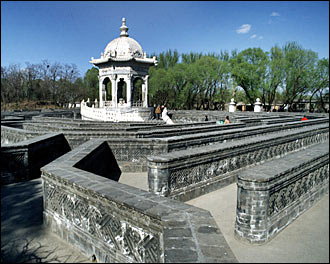In China's water-hungry capital city, it is unusual for a
massive water-saving project to cause a lot of controversy. But
such is the case with the multimillion-dollar scheme to cover the
lakebed in Yuanmingyuan -- Beijing's Old Summer Palace -- with
impermeable membrane.
The project, which involves covering about 133 hectares of the
lake's bottom, has led to an outcry from experts and residents who
are worried about Beijing's underground water supply.
Park staff say that covering the bed will conserve water by
preventing it from seeping into the ground.
"Without the membrane, we have to add water to the lake three
times a year; with the membrane, just once," said a park official
who requested anonymity. "This way, we can save a considerable
amount of money as we don't have to buy so much water. This is
significant because we are on a tight budget."
But many experts are questioning the advisability of the
project.
"It is an ecological disaster and should be stopped
immediately," Professor Zhang Zhengchun of Lanzhou
University told the People's Daily. "Covering the
lake bed with impermeable membrane will cut off its connection with
the underground water system."
Wu Bihu, a professor at Peking
University, agreed. "The impermeable membrane will prevent the
water from seeping into the ground, which will disturb Beijing's
underground water system."
Ground subsidence resulting from water depletion in underground
aquifers is already a serious problem in the capital. As of July
2004 more than 1,800 square kilometers had been affected, with
ground sinkage damaging or destroying about 50 locations in the
city, including factories, buildings and underground pipes, said
Wei Lianwei, director of the Beijing Geological Survey
Institute.
Last summer, Vice Mayor Lu Hao called ground subsidence a "major
threat" to the city.
Mei Ninghua, the director of the Beijing Cultural Relics
Department, is also opposed to the project, albeit on different
grounds: As a city heritage site, Yuanmingyuan must keep its
original environment and appearance. "We have requested the park
stop the project and send a special construction team on ancient
buildings to investigate alternatives. We'll set up a task force to
deal with this problem, explore options and propose a feasible
plan," he said.

Yuanmingyuan, which was burned to the ground by Anglo-French
forces in 1860, is located in the western suburbs of Beijing.
Park officials themselves are not entirely in agreement about
the project.
Some say that an environmental impact assessment has been made
and the scheme will do no harm.
"The project will not completely prevent water from seeping
underground, so it will not disturb the underground water supply,"
Tang Li, of the park's administration office, told the Beijing
News.
However, she declined to give details about the assessment
report.
Another park official, Li Jingqi, director of the Yuanmingyuan
Park Administration Office, admitted "There will be some impact on
the environment but it will not be as severe as those experts have
claimed."
The total spending on the membrane project is reportedly 150
million yuan(US$18 million), a figure Tang dismisses.
"The spending is not that much," she said, but gave no specific
figures.
An online survey on the People's Daily's website showed
92.8 percent of those polled are against the project, while 3.0
percent agree it will save water.
The Beijing Environmental Protection Bureau (BEPB) has now
intervened in the case. On Tuesday morning, officials from the
Haidian District Environmental Protection Bureau and the BEPB's
Assessment Department began investigating the site.
They have already ordered materials related to the project from
the park authorities, which they will review to determine the
potential harm to the environment.
The BEPB and district authorities said that an environmental
impact assessment is a precondition to approval of all major
projects. However, they cannot make a determination about calling a
permanent halt to this one until the results of their investigation
are analyzed.
They emphasized that if the project is found to be in violation
of environmental protection standards, it will be shut down.
The park began work on the project on February 16.

"The main part of the project has been completed. It is
unrealistic to put the brakes on now or remove the membrane," said
Li Jingqi, according to People's Daily. "Whether the
project will be stopped or the membrane removed will be decided by
our boss," Li added.
No one available at the park by press time Wednesday was able to
provide information on whether or how the work got under way
without the required environmental impact assessment.
(China.org.cn, China Daily March 30, 2005)